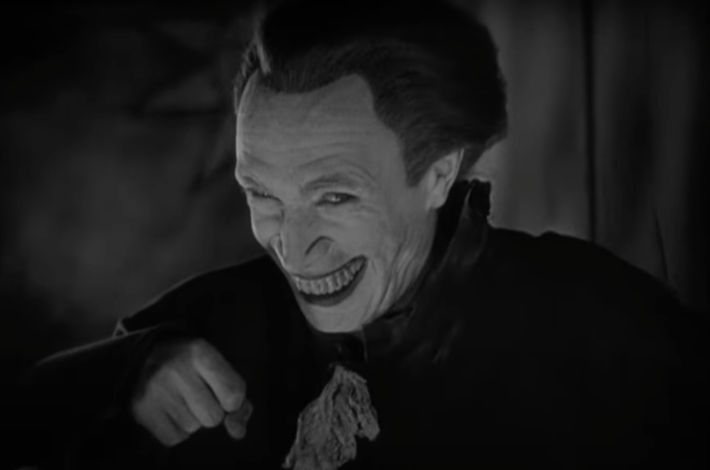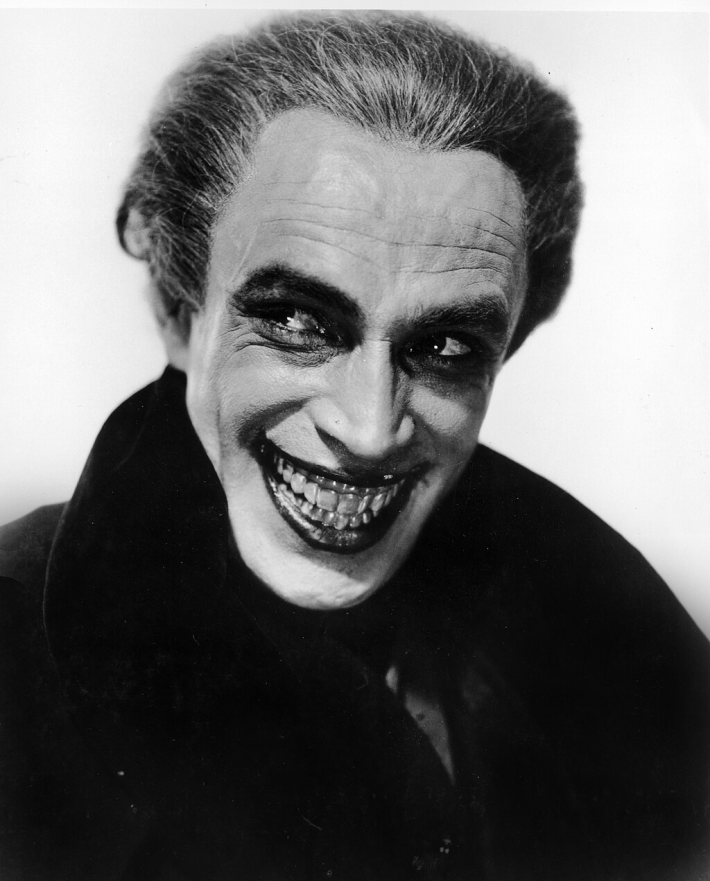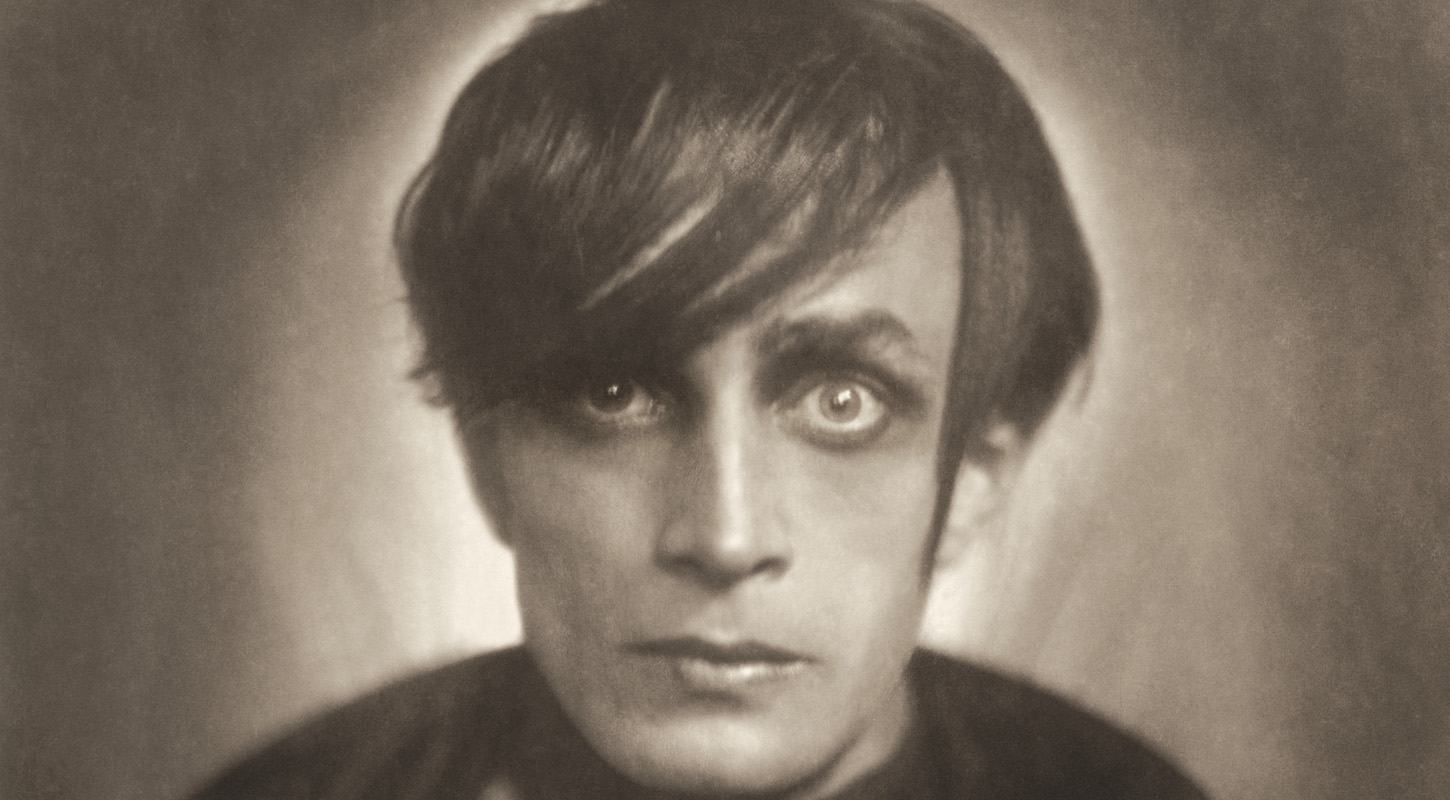It gets only an offhand mention in Barry's blog, but I couldn't suppress a little gasp at seeing The Man Who Laughs in the list of 1928 films that joined Harold Lloyd's Speedy in entering the public domain this week. That's largely because I can't see or hear the words "The man who laughs" in that order without instantly picturing that face:

...which, well, is just the kind of thing you gasp at.
For present-day audiences, The Man Who Laughs probably is most famous (to the extent it's famous at all) as the film that inspired the classic comic-book look of the Joker, Batman's arch-nemesis. The generally accepted origin story has writer Bill Finger showing either Bob Kane or Jerry Robinson or both a photograph, probably this one:

—of the film's main character, Gwynplaine. The elements are all there: the swept-back hair, the gaunt cheeks and darkly circled eyes, the corpse complexion, and of course the gigantic, impossible, very upsetting grin. He looks way scarier than any version of the Joker.
Gwynplaine is no villain, though, but rather the very sweet and sad protagonist of The Man Who Laughs; he's the cruelly mutilated son of an exiled and murdered nobleman, who gets sucked into a bunch of court intrigue–type shit (it's an adaptation of a Victor Hugo jam, with all that entails) by various gross nobles who are all much scarier than him in every way except how they look. I won't spoil the ending.
Gwynplaine is performed by the great German actor Conrad Veidt. For the film, he wore hooks pulling his mouth into that wide and horrible grin, and prosthetics to cover them. Veidt's ability to convey grief and shame and sadness—and also, kindness and tenderness and authentic mirth!—under those circumstances is a pretty remarkable acting achievement, particularly in a film with no spoken dialog. The Man Who Laughs isn't a scary movie, apart from, uh, whenever its main character's face is on the screen. It's a romance. But also, it must be said: The scene of Gwynplaine performing as a clown, mugging for a hysterically laughing audience, makes me want to call up Lankester Merrin.
Veidt didn't look like that! He was a fairly handsome guy, with a sharp jawline, a long compelling beak of a nose, incredible eyebrows, and bright, expressive eyes. Eight years before The Man Who Laughs, he'd played a different vein of spooky-sad as the hypnotized somnambulist murder weapon Cesare in an actual horror film, The Cabinet of Dr. Caligari, but on the whole he doesn't look as scary as the titular doctor, whose wide, insane, rolling eyes dominate the movie. Cesare does little in the film beyond looking freaked out and shambling around a little, and yet Veidt, again working within tough constraints, makes a real character out of him, conveying the tragedy of a young man who has had his entire life stolen away by a bloodthirsty older man's murderous ambitions. (World War I, much?)
Veidt's best-known film, all these years later, is certainly Casablanca, in which he portrays the heavy, Major Heinrich Strasser, a Nazi officer in town to prevent the heroic Czechoslovak resistance leader Victor Laszlo from escaping Axis turf. Veidt makes a frightening character out of Strasser, one completely different from both Gwynplaine and Cesare: His Strasser is a barely contained kettle of violence with gleaming eyes and the twitchy bearing of an attack dog. He's both murderously affronted by Laszlo's courage and, at the same time, almost visibly thrilled at opportunities to dispense threats, terror, and death.
It's a performance steeped in firsthand knowledge of what Nazism and fascism ultimately were and are: crude license structures for cruel idiots who want excuses to hurt people. Casablanca was filmed and released in 1942, at the height of World War II, and Veidt, like the French actors portraying the staff and patrons of Rick's Café Américain, was at the time a refugee from the Nazis. He and his Jewish wife Lilli had emigrated to England in 1933 after his open, outspoken opposition to Nazism and antisemitism made them both unemployable and unsafe in Germany. A sad irony is that for the rest of his career he had trouble finding roles as anything but Nazis. To his credit, he only ever played them as nasty pieces of shit.






